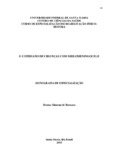| dc.contributor.advisor | Silva, Lucielem Chequim da | |
| dc.creator | Rossato, Bruna Simonetti | |
| dc.date.accessioned | 2020-02-20T12:22:50Z | |
| dc.date.available | 2020-02-20T12:22:50Z | |
| dc.date.issued | 2015-07-08 | |
| dc.date.submitted | 2015 | |
| dc.identifier.uri | http://repositorio.ufsm.br/handle/1/19631 | |
| dc.description | Monografia (especialização) - Universidade Federal de Santa Maria, Centro de Ciências da Saúde, Curso de Especialização em Reabilitação Físico-Motora, RS, 2015. | por |
| dc.description.abstract | Myelomeningocele (MMC) is characterized by being a malformation in the nervous system, in which occur a flaw in the closing of the neural tube and as a consequence, congenital or acquired orthopedic deformities, hydrocephaly, bladder dysfunction, urinary incontinence and the postural deficits, which will make it harder to its satisfactory development. The general objective was to investigate in what way the daily life activities of children with MMC are being performed. It was particularly pursued to detect the functionality of children with MMC in the motor level and in self-care activities; to identify the caregiver perception about the daily life of child with MMC; to verify together with the caregiver if there was occupational therapeutic service, as well as its importance in the recuperation of children with MMC. The study was characterized by being of qualitative nature and of quantitative personality due to its collecting instrument, which was the Inventory of Pediatric Evaluation of Incapacity(PEDI). Later, an interview was applied to the caregivers. Two patients, by the Infant Neuropaediatrical Ambulatory of the University Hospital of Santa Maria (HUSM), formed the sample. The period in which the study was performed was in the months of February until June of 2015, in a natural place. Through this study, it was determined losses in children functional development, in the area of self-care due to the motor deficits. In the interview with the caregivers it was noticed an overload due to the intense care with the children, and that the occupational therapeutic services are necessary during the recuperation period. It is suggested a new study from the collected data with the PEDI, which shows the mobility aspects of these children. | eng |
| dc.language | por | por |
| dc.publisher | Universidade Federal de Santa Maria | por |
| dc.rights | Acesso Aberto | por |
| dc.rights | Attribution-NonCommercial-NoDerivatives 4.0 International | * |
| dc.rights.uri | http://creativecommons.org/licenses/by-nc-nd/4.0/ | * |
| dc.subject | Mielomeningocele | por |
| dc.subject | Terapia ocupacional | por |
| dc.subject | Atividades cotidianas | por |
| dc.subject | Cuidadores | por |
| dc.subject | Myelomeningocele | eng |
| dc.subject | Occupational therapy | eng |
| dc.subject | Daily life activities | eng |
| dc.subject | Caregivers | eng |
| dc.title | O cotidiano de crianças com mielomeningocele | por |
| dc.title.alternative | The daily life of children with myelomeningocele | eng |
| dc.type | Trabalho de Conclusão de Curso de Especialização | por |
| dc.degree.local | Santa Maria, RS, Brasil | por |
| dc.degree.specialization | Reabilitação Físico-Motora | por |
| dc.description.resumo | A Mielomeningocele (MMC) caracteriza-se por ser uma malformação do sistema nervoso, no qual ocorre uma falha no fechamento do tubo neural e como consequência, deformidades ortopédicas congênitas ou adquiridas, hidrocefalia, disfunção vesical, incontinência urinária e os déficits posturais, os quais dificultarão para o seu satisfatório desenvolvimento. Teve-se como objetivo geral investigar de que forma estão sendo realizadas as atividades cotidianas de crianças com MMC. Buscou-se especificamente detectar a funcionalidade de crianças com MMC a nível motor e nas atividades de autocuidado; identificar a percepção do cuidador sobre o cotidiano da criança com MMC; verificar junto ao cuidador se houve atendimento terapêutico ocupacional, bem como sua importância na recuperação das crianças com MMC. O estudo caracterizou-se por ser de natureza qualitativa e de caráter quantitativo devido ao seu instrumento de coleta, que foi o Inventário de Avaliação Pediátrica de Incapacidade (PEDI). Posteriormente foi realizada uma entrevista com os cuidadores. A amostra constituiu-se por dois pacientes, provenientes do Ambulatório Neuropediátrico Infantil do Hospital Universitário de Santa Maria (HUSM). O período da realização do estudo compreendeu os meses de fevereiro a junho de 2015, em local neutro. Constatou-se através do estudo, prejuízos no desempenho funcional das crianças, na área de autocuidado devido aos déficits motores. Na entrevista com os cuidadores foram apontados sobrecarga devido ao intenso cuidado com as crianças, e que os atendimentos terapêuticos ocupacionais se fizeram necessários no período da recuperação. Sugere-se um novo estudo a partir dos dados coletados com o PEDI, que demonstre os aspectos da mobilidade dessas crianças. | por |
| dc.publisher.country | Brasil | por |
| dc.publisher.initials | UFSM | por |
| dc.subject.cnpq | CNPQ::CIENCIAS DA SAUDE | por |
| dc.publisher.unidade | Centro de Ciências da Saúde | por |



